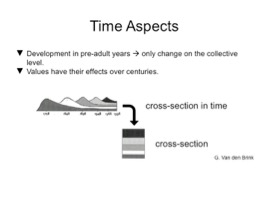Sign up for FlowVella
Sign up with FacebookAlready have an account? Sign in now
By registering you are agreeing to our
Terms of Service
Loading Flow

Basic Values
Values may be researched in different ways. The World Values Survey asks a series of questions and derives values from the response. The researchers Kluckhohn and Strodtbeck follow an opposite direction. They started with a list of 56 values and found through statistical analysis that 10 of them are key for making distinctions between individual persons and 7 for distinctions between states (see stack on the top left). States may then be compared between one another through a so-called co-plot, containing the seven values. If you want to know the score of a state on a given dimension, you start by drawing a line through the central point of the co-plot (in the middle, under Australia) and the arrow of the value in question; the drawing has done so for the value intellectual autonomy. You then draw the perpendicular from the country in question to that line. You then repeat it for other values and other countries.
Values and Time
Values (and beliefs) are developed in the pre-adult years. It implies that on the individual level values are set somewhere between 20 and 25 years of age and do not change afterwards.
On the level of society change does occur but only gradually, if and when children are raised in socio-economic circumstances in which they develop new values; the intergenerational value change (Inglehart). Major changes then require several generations.
The second time related aspect indicates that values are having their effects over generations. Values developed centuries ago are still having their effect. New values are not replacing old values but come on top, like layers of soil. Somehow they still determine the way of thinking of people in a given society. For this reason Inglehart stresses the importance of history and its effects for understanding the culture of another society.

